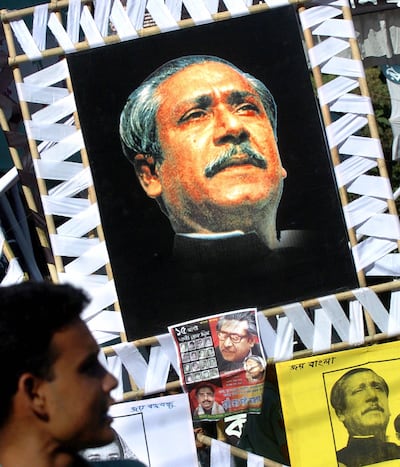Bangladesh executed an army captain after nearly 25 years on the run for the assassination of the country's founding leader, a government minister said on Sunday.
Sheikh Mujibur Rahman, father of Prime Minister Sheikh Hasina, was killed along with most of his family in a military coup on August 15, 1975, nearly four years after he led Bangladesh to independence from Pakistan.
In 1998, Abdul Majed was sentenced to death in absentia along with a dozen other army officers for the murders.
Bangladesh's supreme court upheld the verdict in 2009, and five of the killers were executed several months later.

On Tuesday morning, counter-terrorism officers arrested Majed as he rode in a rickshaw through Dhaka, the Bangladeshi capital.
Prison authorities hanged him after the country's president rejected a mercy plea from the killer.
"He was hanged at 12.01am Sunday," law minister Anisul Huq said, adding that the execution took place at the country's largest prison, outside Dhaka.
Majed was believed to have fled to India in 1996. He returned to Bangladesh last month. Majed's wife visited him in prison on Saturday evening.
Security was tightened around the prison in Keraniganj, the police chief of Dhaka district Maruf Hossain Sorder said.
Ms Hasina, whose public celebrations this year for the centenary of her father's birth have been hampered by the coronavirus pandemic, was in Europe with her sister at the time of the 1975 attack.
In a video message, the country's home minister this week called Majed's arrest "the best gift of Mujib's centenary year".
The road to justice after the 1975 assassination was long, and the killing continues to poison Bangladesh's political scene.
Successive post-coup military governments rewarded the killers with diplomatic positions, and several of them were allowed to form a political party and contest polls in the 1980s.
For 21 years, an indemnity law enacted by the post-coup government prevented prosecution of the killers. This was overturned after Ms Hasina came to power in 1996.
Ms Hasina has also long accused Ziaur Rahman, president from 1977 until his assassination in 1981, of orchestrating her father's murder.
This is denied by his widow Khaleda Zia, prime minister from 1991-1996 and 2001-2006 and Ms Hasina's former ally turned arch enemy who was convicted of graft in 2018, charges she said were fabricated.
After the assassination, subsequent governments and later President Ziaur Rahman awarded the killers by posting them mostly in Bangladesh's diplomatic missions abroad. Majed was posted as Bangladesh's ambassador to Senegal in 1980. Rahman was killed in a military coup in 1981. Ziaur Rahman and Sheikh Mujibur Rahman were not related.
Despite five men who admitted to taking part in the assassination being hanged, the other six convicts, including Majed, were at large. At least one of them is in Canada and another in the United States, officials believe. One man died of natural causes in Zimbabwe.
Bangladesh became independent in 1971 through a nine-month war against what was then West Pakistan, now Pakistan, under the leadership of Sheikh Rahman. He was kept in jail in Pakistan during the war and was freed in 1972 amid a global outcry when he returned to newly born Bangladesh via London and India.









